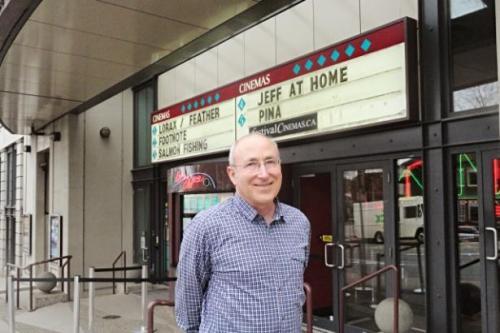By: Jenny Uechi
Originally Published: Apr 22nd, 2012 Vancouver Observer
Stepping through the doors of Fifth Avenue Cinemas, a couple of movie buffs chat about a benefit screening for the homeless. No sign of Coca-Cola or other bubbly soft drinks at the concession stand: just coffee, iced tea and fruit juice. Welcome to Festival Cinemas' premier theatre. Along with The Ridge and The Park, Fifth Avenue Cinemas has shaped Vancouver's film culture. The intimacy and thoughtful movie selection make the Festival Cinema experience vastly different from the shopping centre mega-multiplexes that have become the norm.
Festival Cinemas president Leonard Schein arrived on time, looking relaxed in a simple blue shirt and jeans. Schein's influence on Vancouver has been towering. His capital is social and cultural. In addition to being president of Festival Cinemas (which operates The Ridge Theatre, Fifth Avenue Cinemas and The Park Theatre), Schein is the founder of the Vancouver International Film Festival and is chair of the board of directors of the Canadian Cancer Society – and his work for charities and social causes is legendary. 
Leonard Schein photo by Jenny Uechi
He spoke briefly about his recent “See Again” benefit screenings, which donates 100 percent of proceeds to Seva Canada, a charity that helps prevent blindness and restore vision to people in developing nations. The screenings were threatened by Consumer Protection BC regulations, until Schein spoke out strongly in the press, causing the regulators to back off and allow him to show his films.
The incident highlights Schein's generosity toward charities and his tendency to speak out when he feels that something isn't right.
A life transformed by film
Schein's love of movies dates back to childhood in the 1950s. He was born in Los Angeles, home of Hollywood studios -- but it wasn't exactly a family tradition to go the movies on the weekend.
“My parents rarely went to the films. I think they did when they were single, but my dad worked six days a week as a truck driver. My mother was a housewife, busy with three kids," he said.
His parents may not have been avid cinephiles, but he became one early in life. With a movie theatre just three blocks from his house, the young boy and his friends often visited to see the latest releases.
Schein's eyes were opened to the power of foreign and independent movies when he began studying at Stanford University. For a young man who had grown up watching studio films from the U.S., it was as though a whole new world had revealed itself to him.
“When I went to university, on campus, they used to show films every night – just 25 cents for students,” he said. And the 1960s was a golden age for foreign film directors, with legends like Fellini, Kurosawa and Bergman at their peak.
“Film allows us an exposure to another culture, another country more easily than any other medium,” Schein said. “Of course, books do it as well, but if you read, you imagine what someone looks like, or where a beautiful nature scene takes place. But with movies, you actually get to see the physical space of another country.”
The war in Vietnam – something that Schein had strongly opposed – brought him to Saskatchewan for two years, then westward to Vancouver in 1973. Even though he was working in education at that time, he immediately noticed the lack of options in the city for movie-goers.
"We had two chain theatres here, Famous Players and Odeon Theatres at that time, and they only showed Hollywood studio films,” he said. “This was before video, and you just couldn't see many great films in Vancouver.”
Independent theatres like The Rio on Commercial Drive were showing Chinese and Asian films at the time, but for a culturally specific market.
Schein made a leap of faith and took over The Ridge in Kitsilano in 1978 – a risky move for a man who had spent much of the last decade teaching psychology at various post-secondary institutions, including Capilano College, Douglas College and Vancouver Community College.
“It was hard to leave teaching college,” he admitted. “You're tenured, you have summer vacations, it's steady.” He nevertheless put down $35,000 for the theatre to realize his goal of bringing great films to audiences in Vancouver.
And his gamble transformed Vancouver's film culture.
A “genius” for knowing what people like
Under Schein's direction, The Ridge not only survived, but flourished – it showed movies that no other theatre in the city did.
Art Hister, a physician and prominent media personality who has corresponded for CBC Newsworld and BBC Radio 5 as well as CKNW Newstalk, remembers. Hister's friendship with Schein goes back 40 years, and he has worked alongside him on the executive board of the Vancouver International Film Festival for years.
“When Leonard had The Rocky Horror Picutre Show at The Ridge, it was an amazing thing for Vancouver... it just changed the nature of film-going for a lot of people,” he recalled.
“He used to play it late at night. People dressed in costumes from the movie, recited the whole script. It was a phenomenon. The lineups were around the block. Vancouver is not the funnest city in the world sometimes, but Leonard provided a fair bit of fun.”
With the success of The Ridge, Schein bought more theatres and established the Vancouver International Film Festival in 1982.
Alan Franey, director of the Vancouver International Film Festival who was manager of The Ridge at the time, said, “There was a film society here before, but it wasn't as popular – it was more a high culture thing, like going to the opera. When Leonard came here he could see the city was lacking in cultural offerings and entertainment. He had a good sense that there was a business opportunity.”
“This was not a business in which you got rich – you have to make some pretty good choices just to stay alive,” said Hister, joking that if he ran a theatre, it would have “gone bankrupt in six weeks” because of his obscure movie choices. “But Leonard has a genius for figuring out what people like. His interests are all over the place.”
Asked about his favorite films today, Schein's answers reflected his eclectic taste: he liked Salmon Fishing in Yemen as well as The Artist, enjoyed German dance documentary Pina and praised Iranian drama A Separation. He had also seen The Hunger Games when it first came out. Pressed for a favorite genre or era of movies, Schein shrugged. “I just like good movies.”
Generosity stemming from humble roots
As Schein's theatre thrived, so, too, did the communities he invested in. For the past 34 years, Schein has held frequent benefit screenings to raise money for various causes – they range from street homelessness to environmental organizations to girls' education. He also gives generously to local arts festivals, such as the Vancouver International Fringe Festival.
“He's an amazingly generous person with his space and his time and his money,” said Hister. “You take a group like Doctors Without Borders -- I bet there are few people in Vancouver who support them more actively and with a greater generosity than Leonard."
So what drives him to constantly do work to benefit the community? Schein paused to search for an answer, as though he were being asked something that needed no justification.
His support for social causes isn't any particular family teaching he inherited, or the result of some life-changing incident. It just seems like the right thing to do, he said.
David Jordan, director of the Vancouver International Fringe Festival, noted that Schein was the organization's "top donor" and a longtime supporter of Vancouver's independent arts scene.
"I see Leonard everywhere I go and it’s often at cultural events off the beaten track," he noted. "His involvement starts with the fact that he has a real appetite for the amazing variety of events that make up the culture of our city... I think we need more people like him in (Vancouver)."
A deep-rooted desire for social justice
In addition to Schein's generosity, he's also known as outspoken critic of many federal government policies, including Canada's sale of asbestos to developing countries. Franey described him as someone who “knows he needs to stand up for what's right.” He recently spoke up strongly to the BC government about The Rio's right to screen movies after it was granted a liquor license (the BC Ministry of Energy and Mines has since introduced a policy change to accommodate the sale of alcohol in the theatre).
“We really appreciate someone like Leonard who has been in the industry a long time...for him to speak out helps the rest of us,” said Rio owner Corinne Lea. “When Leonard gets involved, it gives the whole issue a lot of credibility.”
Supporting and giving a voice to social justice is something that has shaped Schein's actions long before he entered the business world, however. As a student during the 1960s, Schein was an active supporter of the Civil Rights movement and opponent of the Vietnam war – his refusal to take part in the conflict led him to move to Canada in the first place.
“I felt very strongly about the war in Vietnam,” he said. “While it was going on in the U.S., I thought, 'we've got to treat people better'.”
Schein doesn't elaborate much about his childhood, but makes quiet references to his brushes with discrimination and inequalities from the past.
“I'd once wanted to join a boys' club,” he recalled. “But they wouldn't let me. They told me they were a 'Christian boy's club'” -- in other words, Jewish boys were not allowed.
Hister said that Schein had a very similar upbringing to himself, removed from privilege and entitlement.
“We know what it's like not to be rich, to be lower-middle class, to do without,” Hister said. “If you've grown up knowing how difficult life is...I think that colours your world. You realize there's lots of other people like that, and you want to help them in any way you can.”
“If you want to understand Leonard, you have to understand the sort of hardscrabble Jewish LA working class side of the family then you also have to see the idealist hippie-era, progressive idealist,” said Franey.
“There's two very different sides of Leonard that are both at play. He is a very generous person in a lot of ways. With The Ridge, the spirit of idealism there in first days was that success of theatre was pretty tremendous.”
A balanced businessman and family man
Franey believes that Schein has been successful because of his delegating skills and ability to trust his staff.
“He was a real pleasure to work with because I always felt that he wasn't looking over my shoulder,” he said. “He may be mistrustful of the world at large and I think he is politically active that way. But with people he knows and trusts, he's very inclusive and very trusting.”
“He balances work and play better than most people I know,” continued Franey. “He finds time for his family and peace of mind and yet he works really hard. He accomplishes a lot during the day.”
“He's a family man ... The family man aspect involves not just a sentimental side but also the practical aspect to make sure you build a strong and secure world for the people you care about,” said Franey.
Hister said that Schein was the “best father he knew”, and in between running Festival Cinemas and serving as president of the Vancouver Jewish Film Festival, consistently carved out time to be with his son and daughter.
“And they've turned out to be great kids,” Hister reflected. “No matter how busy he was, he always made time to be with them.”
The difficult survival of independent theatres in Vancouver
As successful as Festival Cinemas has been, running a movie in Vancouver today is a huge challenge. In addition to the sky-high rent, the availability of cheap movies on NetFlix makes it extra difficult to bring in customers like before. What's more, even the historic Ridge theatre is expected to close down this year, to make room for a $60-million development plan by Cressey that includes about 50 condominiums and a 22,000-square-foot grocery store.
Schein expressed concern that theatres – not just his own, but others in town – were being threatened with closure.
“When you lose a movie theatre, you lose much more than just a theatre,” Schein said. “A theatre gives jobs to people in the neighbourhood, it gives people in the area access to films. You lose the benefits of holding screenings for people in the community.”
He said the solution to keeping independent theatres open is to give incentives, which means help from the City.
"You have to make it so that a developer makes more money by keeping a theatre, rather than having no movie theatre," he said.
He explained, for example, the situation with Vancity Theatre, in which developers were granted special permission to build more condos in another property in exchange for building a theatre there.
Today, an empty store (formerly Meinhardt supermarket) stands ominously next to The Ridge. On weekday evenings, the gloriously retro interior of the theatre has become much quieter than it once was. Unless the public or City Council steps in, this iconic theatre will be gone from the public landscape.
And yet the impact of Schein's first theatre will continue to live on. Vancouver -- now known as Hollywood North -- is home to a thriving foreign and independent movie scene these days. There are some 50 film festivals in town (Vancouver Serbian Film Festival and the Vancouver Asian Film Festival among others). All of these changes may seem to have sprung about organically, but much of it could not have happened without Schein's work to bring more diverse films to the public.
"Vancouver has a good cultural scene, but it could always use more," Schein said. "Culture is what makes a city important."


